HIT CHANNEL EXCLUSIVE INTERVIEW: December 2013. We had the tremendous honour to talk with one of the greatest keyboard players of all time, if not the greatest: Keith Emerson. Keith has a spectacular career as member of progressive rock giants Emerson, Lake & Palmer, The Nice and as a solo artist. Keith was recently involved in the “The Three Fates” project with the conductor Terje Mikkelsen and Munich Radio Orchestra. In 2008 he released the outstanding album, “Keith Emerson Band featuring Marc Bonilla”. Read below the very interesting things he told us:
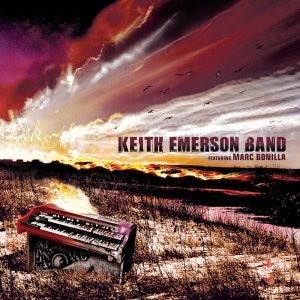 Was it difficult to organise the “The Three Fates” project? It ‘s a very ambitious effort.
Was it difficult to organise the “The Three Fates” project? It ‘s a very ambitious effort.
It is ambitious and it all started I think as idea when conductor Terje Mikkelsen invited me to go to Beijing to oversee a production for the Chinese people to bring attention to pollution and they had combined my Piano Concerto with a Chinese composer’s theme called “The Yellow River Concerto”. They merged them all together and they made a marvelous job, just to bring attention to Chinese about pollution and how clean the rivers can be and how bad can be if you allow smoke and all that stuff into the air. Don’t get me wrong, I’m not into the Green issue like Sting, but I felt “Wow, they are offering me an offer to play my work to China and I have never been to China before”. I went to Beijing and I didn’t have the chance to play with the orchestra but in China you really have to let them know way-way before you go over there what you intend to play. They need to know, you just can’t go to play there. I did that. It was funny experience and I got to visit the Great Wall of China and I have been with lovely people there. It was very nice. Just when I flew back here to L.A from Beijing, I spoke with Terje he said: “We should do more of this. I would like you to arrange your ELP music or some of this and let us do a concert, let us do an album”. So, I couldn’t think nothing more of it and my guitar player, Marc Bonilla, with whom I made an album with (ed: “Keith Emerson Band featuring Marc Bonilla”-2008), I spoke with him about and he said: “Oh yes, it’s great”. You know, I’ve worked with orchestras before and it’s very expensive, it costs lots of money, I really had to get finance by a lot of industries or whatever. It’s very-very costly. I didn’t think anything more would come of it and suddenly Marc called me up and he said: “Wow, we are up to Munich”. I said “Oh, really?” I had actually seen the scores to the orchestrations and I had to approve them and I still thought: “This is gonna cost so much money and it won’t ever happen”. But apparently, it was put together. You know, when you make an album these days, you make sure the finance is there, first of all. But Terje had no doubt about this. He said: “Do not worry about finance, I have back cover”. So, I go: “Ok, this is great”. I had to realise my music and orchestration and work on it and it has all been paid for it. So, I didn’t ask any more questions, that was it.
Will you do more shows for “The Three Fates” project?
Yes, earlier this year I have been back into orchestrating my music. I was actually invited to Kentucky to receive a Lifetime Achievement Award when they would play most of the music which had influenced my bands like Emerson, Lake & Palmer and The Nice. I felt: “Wow, that is great”. I know the classical pianist that did my Piano Concerto, so I said: “Ok, I would love to attend that”. But I really can’t attend receiving a Lifetime Achievement award, unless I play something. By the way, I should mention that the classical pianist is Jeffrey Biegel. He’s a very good friend of mine and a brilliant-brilliant classical pianist. I don’t regard myself as I classical pianist or jazz pianist. I just play the way that I play. So, I was told by the organisers in Kentucky I really can’t go there, unless I play something or do something. I said: “I’ve written a new piece of music. How about I conduct that?” So, the organizers said: “Have you ever conducted an orchestra before?” I said: “Well, actually no”. But, I really intended to go so when I hung up the phone, I said: “Oh my Gosh, what I have let myself into?” So, I looked around and phoned lots of musicians friends and I said: “Do you know anybody that can teach me conducting symphonic orchestra?” Although my piece of music had been written then, conducting an orchestra is quite testing. I had never conducted an orchestra before, but had played piano and conducted it, obviously on my Piano Concerto and also “Pictures at An Exhibition” and many other times, but I had never actually conducted an orchestra. I heard about Peter Bernstein, his father was Elmer Bernstein. His father wrote a lot of amazing film music, mainly the music from “The Magnificent Seven” and “The Great Escape”. Elmer Bernstein is no longer with us but his son, Peter, is a prolific conductor himself. So, I got lessons with him.
Are you satisfied with the feedback you got from fans and press for “Keith Emerson Band featuring Marc Bonilla” album?
Yes, we did tour with it to some degree of success. It’s a fantastic band and my association with Marc Bonilla goes on. Sadly, the finance is not there at the moment to continue a sequel. Marc and I, we continue to write our own music and share our musical ideas together. Sometimes, even record them. I work quite extensively with Marc Bonilla over the last 20 years, I think. Marc is generally working on a TV series called “Justified” and occasionally when he needs some piano on this, I would drive up to his place and I would work on it with him.
How emotional was the writing process of your autobiography “Pictures of an Exhibitionist” (2004)?
Oh, Gosh! I’m very pleased to say that I suppose some people thought it was worthy and been translated into Italian and also earlier this year it was translated into Japanese. I wasn’t sure how the humour would come across, especially in Japan. Every country has its own sense of humour. England definitely has a very ironic sense of humour. I wasn’t sure how this would be translated, but apparently it had very good reviews from Italy and also Japan. It was a 6-year project which started way back when I discovered in my mother’s attic -my mother had a house; she is no longer with us- all these things. She kept every detail of my bands since then, programmes, everything.. I thought there was a book to be written here. So, if anybody is going to write if, it has to be me. That was it. I sat down and I got myself I laptop computer and started the writing of the book.
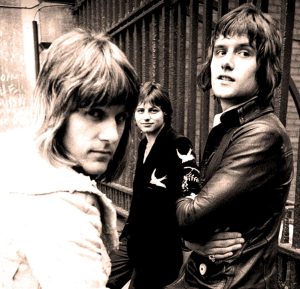 Do you have any clear memories from the ELP appearance at the Isle of Wight Festival 1970?
Do you have any clear memories from the ELP appearance at the Isle of Wight Festival 1970?
I would phone friends of mine that attended the Isle of Wight Festival in 1970 and they would say: “Exactly, yes”, plus they would add their own little stories. So, a lot of times I would be phoning friends or writing to them and saying: “Is this right to you?” and I would send them a draft of a particular paragraph. I tell them “I’m writing essays and if you think I’m wrong, please write me back”. Many say: “I think it’s absolutely accurate!” but the main thing I wanted to do about the book was maintain a sense of humour. I wanted it to be humorous because I think anybody is mad enough to go on the road and spin around on the piano and stick knives in the keys (laughs). You gotta have a sense of humour to do all that.
Why do you consider your appearance at Isle of Wight Festival more important than the California Jam (1974)?
No, I didn’t consider the Isle of Wight performance as more important. But the Isle of Wight Festival was ELP’s second gig. We never thought we actually would get that far, but we played our first gig in Plymouth and I think about a week later we were there. We were the last addition of the Isle of Wight Festival. Nobody knew about us. Later I found that all the critics, the audience, everybody knew about The Nice, King Crimson and they were very sad that both bands had broken up. But the fact is that two members: one member of The Nice and one member of King Crimson, have got together and formed the band and they just call themselves Emerson, Lake & Palmer.
I have read many rumours and you may help me: Were there any plans for Jimi Hendrix to join ELP during their early days?
No, I toured with Jimi Hendrix in the late ‘60s and we had spoken. But I never had any intention of having Jimi join the band. Jimi had his own thing going and I had my own thing going and I want to play with people I can really work out. I might record with him. There were a lot of things, like drug issues, things I don’t really want to get into because he is dead now. You know, I was never partying to that extreme. When Greg (ed: Lake -bass, guitar and vocals) and I, got back to England from West Coast, where we played at Bill Graham’s Fillmore West, we both had agreed that when we go back to England, we would form a band. I checked on quite a few drummers at that time and one of the drummers was actually Mitch Mitchell (ed: The Jimi Hendrix Experience, Dirty Mac). Greg and I, met up with him and I don’t think Greg was too impressed with. We didn’t actually play together.
You have recorded with Mitch Mitchell on “Music from Free Creek” (different super-sessions with Eric Clapton, Dr. John, Keith Emerson, Mitch Mitchell and others-1969).
Oh, I had recorded with Mitch, yes! I made a record with him, “Music From Creek”, yes! He was great. I believed that he would be great but apparently Greg was concerned about Mitch, I don’t know why. I wanted a good band and during the discussion with Mitch, Greg and myself, Mitch mentioned that: “Wow, it’s a great idea”. Of course, Jimi Hendrix was then alive and he said: “Maybe I can get Jimi interested”. So, I said: “Well, ok” but I think a week (ed: actually a month) after that Jimi was found dead. It was much later that I told the story to the press and I may kind of get me a chronological order out of this. And they were like: “Wow, this band, ELP, if Jimi Hendrix had joined, then it would be HELP”. So, they made a story and would copy it for the press. It was farther from the truth than anything else.
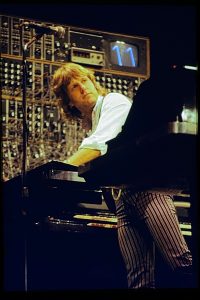 What’s your opinion today about “Love Beach” album (1978)?
What’s your opinion today about “Love Beach” album (1978)?
Whenever someone brings this up, it’s a bit of a shocker (laughs). Let’s tell you the truth: It’s not a bad album. It’s just the album cover. The album cover kind of ruins it. You look at the album cover of “Brain Salad Surgery” or you look at the album cover of “The Three Fates” album and you go: “Wow! Right now, the music that I’m holding and looking at the artist’s work, you can tell that is a piece of solid material”. But, I think it was unfortunate to have the picture of us on the front cover looking like The Bee Gees, oil damped . The reason we chose the title “Love Beach”, was that we were there when we recorded that particular album: At Compass Point in Nassau in Bahamas which is situated on Love Beach. So the idea was that: Ok, The Beatles had done “Abbey Road”, which was the name of the studio they were recorded it, at Abbey Road, with the famous picture of them walking across the crossing lane and we said: “Alright, we will call it Love Beach”. I wasn’t favourable about that. I really wasn’t favourable about that. But the record company said: “It was about time to show your own faces on the album cover looking happy and smiling”. This is the time when the whole crossover was happening with bands, with my contemporaries like Yes and Genesis, who were getting radio-playable material and doing short themes. And ELP had a long discussion with the president of Atlantic Records, Ahmet Ertegun and he said: “Listen, we gonna do it now. Let’s get some radio-playable material. You can do 4-minute tracks and you can always do your other lengthy things at the end of it”. So, we said: “Why not?” We resided in Nassau in The Bahamas and we recorded that at Compass Point Studios and of course we have a photograph taken on the small island, just off of there. It was great time, I really enjoyed it. I know that ELP didn’t enjoy it so much. I bought a boat because I could afford that at that time and I stayed there making albums like “Honky” (1982), and also film music. Most music for Dario Argento was written there.
Do you think ELP have a future as a band?
Well, we are in the process talking about it and the main reason I insisted upon calling the band by our own names, is that I knew that we eventually we were all going to do our own individual things which is exactly what is happening right now. Carl Palmer (ed: drums) is playing with Asia; Greg Lake is doing his solo tours and I am doing my own solo works myself: my conducting and writing. Yeah.
In 2007 you opened the Led Zeppelin reunion along with Chris Squire and Alan White (bassist and drummer of Yes). Did you have a good time that night?
Yes, I did! I really enjoyed it, yes! Despite the fact that we had absolutely no soundcheck; people still walking in. I don’t know how many people actually came to hear what we did. It was a great fun. I mean, l love Alan White, I love Chris Squire a long-long time. Yeah, it was fun. Really, I wanted to have ELP open for Led Zeppelin.
I think the original idea was for a reunited Cream to open for Led Zeppelin.
Oh, was it? There were a lot of rumours coming around. I suggested that ELP should open it. But Carl and Greg didn’t want to do that. They said: “If we do that, we would be completely ruled out. Everybody is going to be there to personally see Led Zeppelin. So, we shouldn’t do this”.
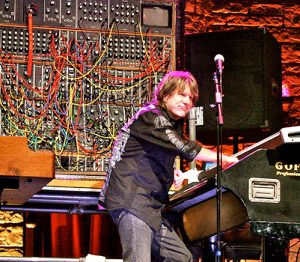 I think it was the right decision not to do it.
I think it was the right decision not to do it.
You know, I loved Ahmet Ertegun and sadly he’s not among us now. Basically, I wanted to support his charities and anything else. And I went: “Ok, if ELP don’t want to do it, I’ll get my own band together”. So, everybody thought it was a great idea. It was an opportunity to work with Chris Squire and Alan White. We had fun doing it. So, both Greg and Carl stayed out of it and said: “No, no, it’s not the right thing to do”. I mean, in retrospect, I suppose what I did with Chris and Alan and the rest of them, was kind of lost. Although, there were quite a few fans in the audience which went: “Oh, that is pretty cool”. Everybody really went to listen to Led Zeppelin, that’s why they were there.
Did you feel any kind of fear when you burned the American flag onstage with The Nice at Royal Albert Hall in 1968?
No, not at all. In fact, it wasn’t a real flag. I made a painting on stage of the stars and stripes. I was doing the performance of The Nice’s “America” . Everybody was protesting about the fact of John F. Kennedy, Robert Kennedy, Martin Luther King and so many other assassinations in America, we had all witnessed. How quick the State Patrol comes out on the street. We were very much impressed then. When I learned that Robert Kennedy was shot, I came up with the idea of “America” and we were already invited to play at the Royal Albert Hall, which is one of the biggest venues in London. I decided to make some sort of a statement. A lot of artists, such as Bob Dylan and Donovan, made their own feelings known vocally. But with the “America” piece, an instrumental), the company we were at that time, Immediate Records, said us: “Go ahead, we will release this as a protest instrumental”. So, when we played at the Albert Hall, that was what I thought about doing. Yes, it got me into a lot of trouble. It drew us a mark that fact. But it drew attention to us. You know, I’m not like Bono. I’m not able to make political statements and those kinds of things and get involved with politicians or whatever. It was a time of my life when I thought: “Yeah, this is weird. If they don’t like a president, they would shoot him. If they don’t like certain people, they would shoot them too”. I said: “It was something very wrong with this”.
You worked with the director Dario Argento for “Inferno” (1980) film and the “World of Terror” (1985) documentary. Was Dario Argento an easy-going person to work with?
He was pretty much easy-going to work with. He pretty much left me to my own devices. He didn’t really interfere anyway. I think at one point he came to me and had a concern that I haven’t really made much of a feature of Verdi. I told him: “Oh, listen to “Taxi Ride”, and that’s the Verdi thing (ed: “Va, Pansiero”). But it is in 5/4”. And he was: “Oh! Ok”. I think that’s the only thing he concerned about, actually. Except that time, I was left on my own to get the orchestra together and do everything. Yeah, it was a fun arrangement.
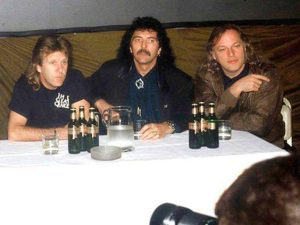 There is a great photo of you, Tony Iommi (Black Sabbath) and David Gilmour (Pink Floyd) sitting at a table during the press conference about the Rock Aid Armenia project in 1990. Did you have a good time recording “Smoke on The Water” with all these important musicians?
There is a great photo of you, Tony Iommi (Black Sabbath) and David Gilmour (Pink Floyd) sitting at a table during the press conference about the Rock Aid Armenia project in 1990. Did you have a good time recording “Smoke on The Water” with all these important musicians?
David Gilmour, yeah, he’s a very sweet guy. I don’t recollect that photograph. There were so many people: Bryan Adams, I remember him, Bruce Dickinson (Iron Maiden). We haven’t really known each other very much but I just went in and there was a keyboard there and the engineer and the producer said: “Can you play over this a bit?” So I did. And had no idea of what I was playing. There were so many other keyboard players there. I’m in there, somewhere.
Do you wish The Best supergroup [John Entwistle (The Who bassist), Joe Walsh (The Eagles guitarist), Jeff “Skunk” Baxter (Steely Dan guitarist), Simon Phillips (Toto, Jeff Beck drummer)] had lasted longer?
Oh, most definitely yes! But in fact, I was just asked by Cleopatra Records to do a Doors tribute. To play on at least one particular number. And I said: “Ok”. This album apparently is going to come out in January.
Which song do you play?
I actually wanted to do “Light My Fire”, but they told me that Rick Wakeman (Yes) was working on that (laughs). I did “People Are Strange” and I play with Jeff “Skunk” Baxter who was a member of The Best. So, we did that. It’s very acoustic. I’m just playing acoustic piano and had an acoustic bass player and Jeff “Skunk” Baxter on guitar.
Why The Best didn’t last longer?
Well, actually Joe Walsh was having some problems at that time. He didn’t want to continue. I don’t think his opinion was absolutely great. I really enjoyed playing with Simon Phillips John Entwistle and Jeff “Skunk” Baxter. Of course, I totally enjoyed playing with Joe Walsh. But he was having some private problems which are over now, but weren’t at that particular time. He completely retreated after our shows and got himself better.
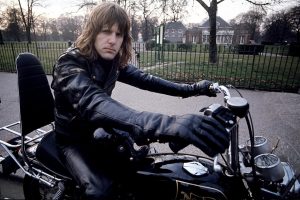 Do you believe that popular music which was written in the ‘60s and ‘70s was much better than today’s music?
Do you believe that popular music which was written in the ‘60s and ‘70s was much better than today’s music?
At least the tunes which are out there. The normal person that probably doesn’t play an instrument or whatever but likes to listen to music, they liked to hear the tune. I don’t think there is much melody in today’s music. Unless you really go into other fields like jazz. There is a lot of great music, but sadly it’s all ignored. You really have to be sensational, make some kind of fame for yourself, I don’t know. It’s all sensationalism and they disregard the creativity of actual music. It’s rather sad. I remember when the first Beatles albums came out and I hadn’t yet got into the music business, but more of the musicians I hung out with, were saying: “Have you heard the new Beatles album?” You should listen to George Harrison’s guitar, you should listen to Paul McCartney’s bass playing. Unbelievable. And the lyrics that John Lennon has written with. It would be a huge discussion. These days, you don’t get that at all. Nobody is bothered about who the guitar soloist is on a Lady Gaga album. Nobody gives a shit (laughs)!
Can you explain us why did you call Richard Wright (Pink Floyd keyboardist) “the most unassuming gentleman of prog rock as you know it today”?
Yes, he was a very gentle guy. I mean, very unassuming. He never wanted to be flashy or doing any of things that Rick Wakeman and myself did. No, he was just quiet and intended to sit back and be constructive and play keyboards. He was a lovely guy. I mean, don’t get me wrong with the word “unassuming”.
No,no. It’s a positive word. He was low profile.
Yeah, “low profile”. That’s the word.
Among fans there was a debate about who is the better keyboard player: you or Rick Wakeman (Yes). Do you think that those kinds of debates are pointless?
(Laughs) Well, that they are. It’s a little bit like when Eric Clapton was asked: “Who do you think is the better guitarist: You or Mark Knopfler (Dire Straits)?” And Eric said: “Well, I play my way and he plays his way”. So, basically that’s my answer when they bring this question about Rick Wakeman and me. Rick plays his way and I play my way. He’s a very-very flexible keyboard player and I like him tremendously. It’s a lot of fun to be with him, particularly his sense of humour. Yeah, it’s a mutual admiration society but Rick Wakeman plays his way and I play my way.
Do you still have the two Hitler Youth (Hilterjugend) knives that Lemmy (Motorhead) gave you when he was roadie of The Nice (Keith used knives to hold down notes and play other things during solos)?
No, I actually gave them away to an artist dealer who wanted them.
They were collector’s items. They were valuable.
I guess, they are now (laughs).
Had you ever met John Lennon?
No, I never met John Lennon. The only Beatle I have met was Ringo (ed: Starr- drums)
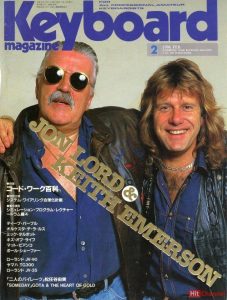 Can you tell us a few words about Jon Lord (Deep Purple keyboardist)?
Can you tell us a few words about Jon Lord (Deep Purple keyboardist)?
Jon if you take his last name literally, Lord, yeah I suppose to refer to him as a lord. Because he had all that British politeness and everything else about him. I don’t think he really enjoyed all the extras that went on with the rock ‘n’ roll business of Deep Purple. I don’t think he was too happy with being around all the excesses that the rock ‘n’ roll industry involved. I think he was very uncomfortable with that. Which I was too, to a degree. I think that both Jon and I, thought at some point and said: “Oh, we are gonna be rock stars”, but never went to that excess that most people did. I think that really was the course for John and myself to get more established and the only way to do that, was to try get an orchestra to play your material. When I was working with The Nice with orchestrations and I paid some orchestral courses, then I heard that Jon Lord of Deep Purple had written a Concerto for Group and Orchestra. So, I was so impressed at Royal Albert Hall when Sir Malcolm Arnold conducted Jon Lord’s Concerto for Group and Orchestra (1969). I must confess, I thought it lacked certain thematic development.
It was the first attempt.
Yes, it was. I was just coming out of the recording studio with my orchestra doing “The Five Bridges Suite” (ed: by The Nice-recorded on 17 October 1969, released in June 1970), recorded at that time, so as I was mixing that, we were kind of both on the same parallel. When I later met Jon Lord in Japan when we did an interview for a Japanese magazine and the first question that was asked both of us: “Who did it first?” and Jon said: “Well, I don’t know. It must be something about like we both are drinking the same water”. We both were aware of what each other was doing. I never really went out to listen to the finished version of Deep Purple’s “Concerto for Group and Orchestra”. But I’m quite sure that Jon Lord did go and find my “Five Bridges Suite” (laughs). We all were aware what each other is doing. That was the thing back then: We just wanted to know what new is happening, and we paid attention to other people’s direction just because somebody is doing something else.
A huge “THANK YOU” to Keith Emerson for his time and the great answers. I would also like to thank Ellie Schwartz for her valuable help.
Official Keith Emerson website: http://www.keithemerson.com
Official Keith Emerson Facebook page: https://www.facebook.com/KEITH.EMERSON.OFFICIALPAGE

